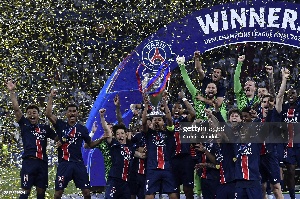- Home - Entertainment
- Lifestyle News
- Year In Review
- Music News
- Entertainers
- Entertainment Archive
- Entertainment Photos
- Jokes
- Entertainment Headlines
- Ameyaw Debrah
- Brown GH
- Celebrities Buzz
- GH Base
- Ghana Celebrities
- Gh Gossip
- GH Page
- GH Splash
- Hot Gossip GH
- YEN
Music of Monday, 2 June 2025
Source: www.ghanawebbers.com
How fake views, bought likes, and stolen streams create artificial celebrities
In the world of digital fame, not everything is genuine.
Many influencers with millions of followers built their audience through follow-for-follow tactics. Those TikTok likes? Often generated by bots. Even the lively comment sections may come from server farms in India. This raises questions about the authenticity of these celebrities and their numbers.
Today, fame can be easily manufactured. In the past, becoming a star required auditions and hard work. Stardom was a slow process fueled by talent and timing.
Now, it can be achieved with decent Wi-Fi and hashtags. With bots and rented followers, anyone can become a public figure quickly. No need for tours or studio time—just metrics.
We are seeing algorithmic idols rise to fame. These celebrities are created through manipulation rather than talent. Their skill lies in navigating platforms, not performing for audiences. They collect impressions instead of captivating fans.
Fame has shifted from excellence to a numbers game. The scoreboard now includes likes, shares, streams, and follows. The rewards are influence and endorsements—but fake numbers lead to hollow fame.
Welcome to the influencer industrial complex where popularity is purchasable.
Digital Doppelgängers
Fame used to be earned; now it’s engineered. Influencers often have fake followers while musicians use stream-farming tactics for chart positions. The internet is filled with counterfeit clout.
Artificial celebrities thrive in a system that values numbers over substance. They inflate their worth through fake engagement and streams.
The Business of Bogus Influence
Why create fake fame? Because it pays well. Brands invest billions in influencers with large but often unreal audiences. By 2025, this industry could reach $24.1 billion according to Influencer Marketing Hub.
However, many ad dollars go to bot-boosted accounts instead of real creators.
How Fake Fame Works
Fake fame relies on digital illusions built on smoke and mirrors. It begins with purchased likes and followers from click farms—ghostly fans lacking real engagement.
Need a million plays? There’s a bot for that too—sometimes using unsuspecting users’ accounts for streams. Stream farming involves devices replaying songs endlessly to create false buzz—a trickery based on algorithms rather than artistry.
The Cost of Counterfeit Clout—and the Battle to Fix It
Fake fame harms everyone involved—it creates an unfair playing field for real artists competing against illusions. Brands waste budgets on hype that yields no return on investment (ROI). Fans struggle to connect when they can't identify who is authentic.
In music, fake streams distort charts and mislead labels scouting talent.
The IFPI estimates that stream fraud cost the industry $1.4 billion in 2020 alone.
Fortunately, efforts for authenticity are increasing as platforms crack down on bots and suspicious activity.
Organizations like IFPI and RIAA fight against digital deception.
Yet new scams continue emerging—more sophisticated bots and deeper fakes complicate matters.
The battle continues as stakes grow clearer.
What Comes Next?
Fame shouldn’t be bought but often is today through vanity metrics driven by algorithms.
The future should focus on real talent rather than those who pay for visibility.
Supporting authentic creators who build communities over mere followings is essential.
We also need better metrics; big numbers don’t always mean significant impact.
Platforms must take responsibility—they shape who gets seen or paid.
Authenticity should be standard—not a gamble within algorithms.
Final Note: Keep It Real
Clout based on clicks is fragile; truth can bring it crashing down.
Authenticity lasts longer than illusion.
As entertainment faces this digital crossroads, we must choose wisely: support those who earn their spotlight or amplify masters of deception?
In an age where faking it seems easier than making it, being genuine stands out as boldness itself.
Cleaning up the digital stage means raising standards—not just eliminating bots but promoting true talent rooted in credibility that no algorithm can replicate.











